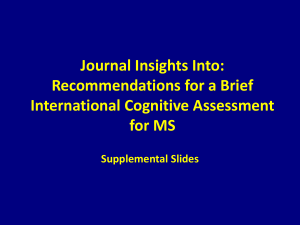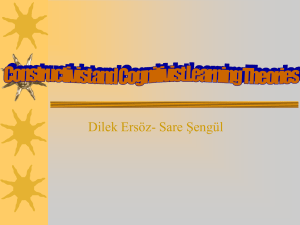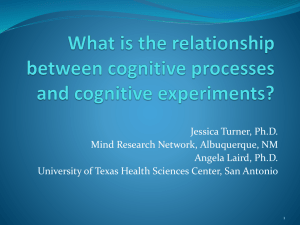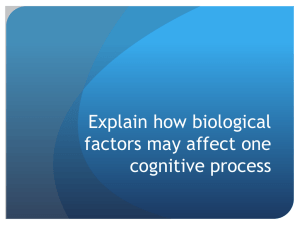Neuropsychology and Schizophrenia
advertisement
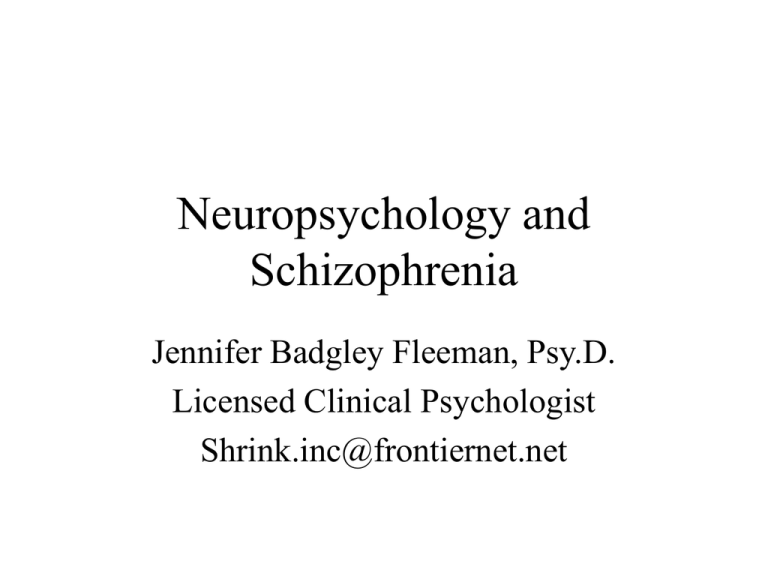
Neuropsychology and Schizophrenia Jennifer Badgley Fleeman, Psy.D. Licensed Clinical Psychologist Shrink.inc@frontiernet.net Outline • Schizophrenia – brief overview • Nature of assessment with the mentally ill • Common neuropsychological findings in schizophrenia • Medication effects • Insight and outcome Schizophrenia • Chronic psychiatric disorder • characterized by disruption in affective, cognitive, behavioral, and social domains • that results in poor ability to maintain adaptive functioning in the community. Schizophrenia • Lifetime prevalence from 0.5% to 1.0% of the population (APA, 1994) • Usually manifests itself between ages 18 and 25 • No gender discrepancy (prevalence) Symptoms of schizophrenia • • • • Delusions Hallucinations Disorganized speech Grossly disorganized or catatonic behavior • Negative symptoms • Social/occupational dysfunction • >= 1 month active sx; signs for >= 6 months • Positive symptoms – Excess – Delusions, hallucinations, loose associations • Negative symptoms – Lacking – Poor motivation, social withdrawal, flat affect, diminished speech content Subtypes • DSM-IV – – – – – Paranoid Disorganized Catatonic Undifferentiated Residual • Distinction between “Functional” and “Organic” etiology is outdated • Psychiatric disorder with neuropsychological correlates Schizophrenia -Theories of Etiology • • • • Immunologic/Viral factors Disruption of neuroanatomical development in embryo Dopamine Hypothesis: Excessive dopamine Structural brain abnormality: Enlarged lateral and third ventricles found in neuroimaging and post-mortem studies • Cortical atrophy/ volume loss: atrophy in hippocampus and amygdala, left temporal lobe • Functional brain abnormality: Hypometabolism in dorsolateral pre-frontal cortex and hippocampal regions noted during certain cognitive tasks • Genetics with influence from environment Nature of Assessment • 1) Multiple factors to consider (medical, emotional, behavioral, cognitive) • 2) Contribution of mental illness, neurological disorder (if present), and medical illnesses (if present) to their symptom presentation • 3) Assessment issues (attention/concentration, behavioral/compliance, motivational issues) and time factor Common Referral Questions • Change in cognitive functioning not associated with psychiatric decompensation • Deficits in cognition disproportionate to mental illness • Sudden onset of cognitive dysfunction • Assessment of cognitive functioning to assist with treatment/discharge planning; evaluate strengths/weaknesses • Provide baseline against which future performance can be compared • Re-assessment of cognitive function (progress, decline) • Evaluation of specific areas of functioning (e.g., memory) • Rule out dementia • Competency (e.g., independent functioning, forensic) Tests Used to Answer Referral Questions • Use common neuropsychological and cognitive tests • The tests may or may not have norms for individuals with particular mental illnesses • Look at pattern of scores and degree of impairment Schizophrenia and Cognitive Impairment • Cognitive deficits are heterogeneous, but impairment in three functional domains are most often identified: – Attention – Memory – Executive Functioning • Negative symptoms associated with greater cognitive impairment • Typical course of cognitive impairment: – Initial decline in cognitive functioning soon after the illness onset, then fairly stable. Attention • Attention: – Automatic stimulus processing (without awareness): • Ex:Acoustic startle • Ex: P300 – Difficulty with other attention functions: • Initially focusing (irrelevant details) • Divided attention/ Working Memory • Vigilance (maintaining attention) – CPT (A X paradigm) – Selective attention o.k. Memory • Working Memory: • Memory: – Impairment in both verbal and nonverbal memory – Difficulty with encoding/learning (organization/ integration of current input with past experience) and retrieval; Recognition superior to recall – Able to benefit from repetition to learn and cues to recognize Executive Functioning • Executive Functioning: – Poor planning, organization, problem-solving, cognitive flexibility, self-monitoring – Impaired insight and social judgment – Lack of initiative/ motivation Intelligence • Decrease due to pathological changes • Estimating pre-morbid IQ – – – – Previous testing Certain cognitive measures School records Algorithms Other Cognitive Findings • Language: – Language generation problems – No problems understanding single words/simple sentences, but difficulty comprehending longer sequences Schizophrenia: Other Cognitive Findings • Visuospatial/Constructional: – Generally no impairment copying simple designs – Difficulty with complex figures/ construction (e.g., Block Design, Object Assembly, Rey Copy) – Data suggests problems in organization rather than visuospatial processing Schizophrenia: Other Cognitive Findings (cont.) • Motor: – Slow reaction time is most common finding – Incoordination, clumsiness, tremors, posturing Cognitive Patterns in Type I vs II • Type I (positive sx): – Not associated with global cognitive dysfunction – Hallucinations/ delusions not sig related to cognitive performance – Thought disorder disrupts attention and language performance • Type II (negative sx): – More associated with global cognitive dysfunction – More problems with visual-motor, visualspatial, and attention – Transient negative symptoms vs. “deficit syndrome” Example: Mr. X • Basic Demographics – 45 y.o. male – 14 years education • Chronic Paranoid Schiz; Polysubstance Abuse • Psych history – Multiple psych hospitalizations since age 25 • ?head injury • Symptoms at admit: – Paranoia – ?auditory hallucinations – Guardedness – Thought disorder – Social isolation – Flat affect – Med. Non-compliance Mr. X’s scores • IQ----------------------------• Attention/Working Mem-• Verbal Memory – Immediate Recall--------– Delayed Recall-----------– Recognition---------------- • Average • Low average – borderline • Impaired • Borderline • Average • Visual Memory – Immediate Recall--------– Delayed Recall------------ • Low average – borderline • Low average - borderline Mr. X’s scores (cont.) • Language-------------------• Visuospatial/Visual-motor • Executive Functioning – Cognitive Flexibility----– Reasoning-----------------– Processing Speed--------- • Average • Average • Low average • Average • Low average - borderline Mr. X - Impressions • Relative cognitive weaknesses: – – – – Auditory and visual attention Memory encoding/retrieval Working memory/cognitive flexibility Processing speed • Relative cognitive strengths: – – – – – IQ Language Memory Retention and recognition Visuospatial/Visual-motor integration Reasoning • Consistent with schizophrenia Example: Mr. Y • Basic Demographics – 55 y.o. male – 10th grade education • Schizophrenia, Undifferentiated Type; hx Alcohol Dependence • Psych history – Multiple psych hospitalizations since age 16 • No hx LOC • COPD; Psychogenic Polydypsia • Symptoms at admit: – – – – Prominent negative sx Confused; disorganized Polydypsia; dysruptive Increased forgetfulness & confusion since admit Mr. Y’s scores • • • • • Current results Mental Status (20/30) Simple Attention----------Working Memory---------Verbal Memory – Immediate Recall--------– Delayed Recall-----------– Recognition---------------- • Visuospatial/Visual-motor • Changes? Past/ Present • No change • Low avg/ severe impaired • Mild Impair/ severe impaired • Mild Impair/ severe impaired • Low avg/ severe impaired • Borderline/ severe impaired Mr. Y’s scores (cont.) • Current results • Language-------------------- • Changes? • Average/ mod impaired • Executive Functioning – Cognitive Flexibility----– Planning------------------– Processing Speed--------- • Low avg/ severe impaired • No change (impaired) • No change (impaired) Mr. Y - Impressions • Pattern of results: – Global difficulties that cannot be fully explained by presence of chronic schizophrenia and COPD • Severity, pattern (language, recognition) • Decline: • Global (verbal & visual memory, working memory, cognitive flexibility, language, etc.) • No decline in simple attention, planning, processing speed • Consistent with combination of factors, including long-standing alcohol abuse, chronic schizophrenia, COPD, and dementia Medication effects: Antipsychotics • Conventional Antipsychotics: – Anticholinergic effects (memory, concentration) – Impaired motor functioning; slowed processing speed; anticholinergic meds to control extrapyramidal symptoms can also adversely affect memory • Atypical/Novel Antipsychotics: – Some evidence that they work to decrease negative symptoms (including cognitive impairment) as well as positive symptoms Medication & Cognitive Functioning -Current Literature • Atypical antipsychotics may have a beneficial effect on negative symptoms of schizophrenia, but this is controversial; • Conventional antipsychotics are usually noted as being only effective for positive symptoms • Newer medications (e.g., Ability) may hold promise for negative sx and cognition Example: Mr. Z • Basic Demographics – 32 y.o. male – 11th grade education + GED • Schizoaffective; ETOH + THC dependence; Antisocial Personality Disorder • Legal History: – Extensive • Psych history – No prior psych hospitalizations; – Hx depression, hypomania, aggression, poor impulse control, poor insight • Medical history – Multiple concussions Mr. Z’s scores Current results • Attention-------------------- Changes? Past/ Current • Avg/ low avg • Working Memory---------- • Avg/ borderline • Verbal Memory------------ • Largely consistent, except more vulnerability to distraction • Visual Memory------------- • No changes Mr. Z’s scores (cont.) Current results • Visuospatial/Visual-motor Changes? Past/ Current: • No changes except decreased for tasks requiring speed • Language-------------------- • No changes except verbal fluency decline • Executive Functioning – Problem-solving--------– Reasoning----------------– Planning------------------– Processing Speed-------- • • • • No changes No changes No changes Borderline/ extremely low Mr. Z - Impressions • Pattern of results: – Declines: • Complex attention/working memory, susceptibility to distraction, processing speed, verbal fluency – No declines: • Reasoning, verbal learning and memory, visual learning and memory, abstract reasoning, problemsolving, planning • Consistent with common side effects of antipsychotic and anti-convulsant medications Remediation, compensatory strategies, medication, etc. • Cognitive strategies: retraining • Compensatory: utilize strengths, use modifications • Environmental modifications • Medication: Aricept, etc. Insight into illness and outcome • Insight into psychiatric illness critical to outcome (probably #1 for many of these patients) • Cognitive dysfunction highly predictive of prognosis (as important as “typical” psychotic sxs) • Cognitive dysfunction sometimes linked to excess medication dose as evidenced by EEG changes Cognitive Impairment & Insight -Literature • (Amador et al., 1991; Lysaker & Bell, 1994): – Poor recognition of illness secondary to deficits in abstract and flexible thinking • (Amador et al., 1994): – Poor insight is a prevalent feature of schizophrenia, and may stem from neuropsychological dysfunction; – Increased formal thought disorder correlated with lower insight into mental illness and social consequences of it. Cognitive Impairment & Insight -Current Literature (cont.) • Severity of poor insight strongly correlated with degree of structural dysfunction (frontal lobes) and executive dysfunction (WCST, verbal fluency, Trails) Cognitive Deficits and Daily Functioning • (Green, 1996) Functional outcome of cognitive deficits: – Verbal Memory associated with all types of functional outcome (e.g., social skills acquisition, community outcome, social problem-solving) – Vigilance related to social problem solving and skill acquisition – Card Sorting predicted community functioning. Conclusions • Questions? • Comments?

